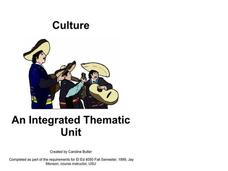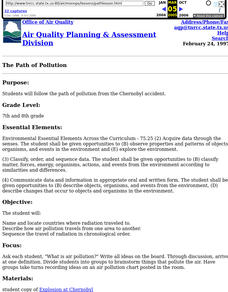Curated OER
Brainstorming for Consensus
Students practice brainstorming ideas about different topics. They discover how to come to a consensus about a given situation, by evaluating their brainstorming ideas.
Curated OER
Turtle Sightings
Third graders research turtles and the ways they have adapted to their marine environment. They work in groups and publish their findings using SiteMaker a web-authoring tool.
Curated OER
Putting on Mass: Just how do Trees grow?
Students articulate an explanation of photosynthesis. They identify problems they have with comprehension of how a plant gains mass. Students describe a historical experiment.
Curated OER
Bird Stories: Fact or Fiction
Students evaluate/distinguish scientific fact from fiction. They discuss similarities and differences in the life cycles of various birds. Student use the Internet as a research tool.
Curated OER
Ecological Communities:The Prairie
Students study the meaning of ecological community and recognize its complexity. In this ecology lesson plan students diagram a food web.
Curated OER
Artist & Attitude
Young scholars understand the importance of tone in a piece of artwork. They become more aware of purpose before they evaluate any form of art. Students use tone to help establish the success of a written story.
Curated OER
Creating Gardens
Students are shown that numeracy is all around them. They use volume, and calculate the quantity of soil required to make a garden to given instructions. Students are asked how to calculate the amount of soil required for the garden.
Curated OER
What Is A Dinosaur?
Students use the question of "What is a dinosaur?" in order to establish the context for a class investigation. They use a variety of resources in order to gather information. Students compare and contrast the similarities or differences...
Curated OER
Violets, Daffodils, Roses and Thorn
Fourth graders complete a variety of exercises and activities surrounding the scientific and artistic properties of the parts and processes of a plant/flower.
Curated OER
Everyday vs. Extreme Relationships with Nature
Learners examine the interactions with nature and the environment. They discover where water comes from and ways to conserve water. They also examine energy sources and consumption.
Curated OER
Project Design
Twelfth graders study Thoreau as "philosopher" and developing a personal philosophy of life (both metaphorically and literally). They come to an understanding of the interconnectedness of the natural world. Students come to a realization...
Curated OER
What's Hatching in Kindergarten?
Students identify oviparous animals. They brainstorm a list of animals that lay eggs, read "Chickens Aren't The Only Ones" by Ruth Heller and then add to the list. Students complete a booklet that shows an egg and an oviparous animal.
Curated OER
The Formation of Soil
Students identify the different components that make up soil. In this earth science lesson, students create a pamphlet for next year's class. They analyze how erosion and weathering shape the Earth.
Curated OER
Defining Culture
Second graders define the term culture and are exposed to a variety of cultures from around the world. They read books, play Native American games, develop a class book that examines their own culture and, after examining currencies from...
Curated OER
The Path of Pollution
Students follow the path of pollution from the Chernobyl accident. Students name and locate countries where radiation traveled to, describe how air pollution travels from one area to another, and seqence the travel of radiation in...
Curated OER
The Grass is Always Greener
Third graders experiment with common grass and cellular division.
Curated OER
"Greenhouse" Sprouts Garden
Students grow sprouts in soil inside clear plastic bags. They record and monitor the growth for five days, and present their findings to the class.
Curated OER
BEWARE OF POISONS
Learners research and explore all the safety conditions to being exposed to poisons in real-world situations. They review/discuss/investigate about types, sources, effects and responses of poisons by creating general questions to pose to...
Curated OER
John Muir: Long Ago and Now
Students explore nature objects brought indoors such as rocks, seeds, leaves and shells to identify where the objects came from. They hear stories about John Muir's life and make booklets about nature areas they enjoy.
Curated OER
Using the Herb Garden at Blakesley Hall
In this Blakesley Hall herb garden worksheet, students explore the herb garden at Blakesley Hall. This worksheet gives suggestion for activities while on this field trip.
Curated OER
School Forest Lesson- Looking at Literature
Students compare what they learned though literature to the school forest. In this environment lesson, students visit the forest surrounding their school to listen to literature and identify objects in nature. Students create a display...
Curated OER
Human Evolution
Students make and use observations of Laetoli footprints to provide clues to life in the past. They collect and analyze data to study the relationship between foot length and body height.
Curated OER
A Walk in the Woods
Students observe an environment, ask questions about what they observe. and design experiments to answer one question they came up with in this upper-level High School or college lesson. The lesson requires an outdoor exploration or...
Curated OER
Six Levels of Ecological Organization
Ninth graders describe the six levels of ecological organizations and give examples of each. They also differentiate between food chains and webs and identify trophic and consumer levels in food chain and food webs.

























